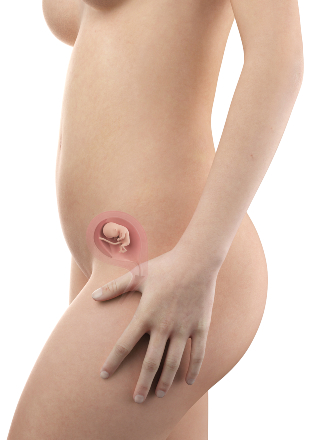You’ve made it to Week 10—what a wonderful milestone! By now, you might be starting to notice your pregnancy becoming a little more “real.” Although every pregnancy is unique, this week is often an important time because your baby (still called a fetus) is growing rapidly, and you may be noticed new changes in your own body.
At 10 weeks, your baby is about the size of a small strawberry. The most exciting news is that nearly all of their major organs are formed! In fact, tiny details like fingernails, hair buds, and even tooth buds are beginning to develop. Even though you can’t feel movement yet, your baby is starting to wiggle and even practice tiny kicks and stretches inside you.

For many moms, early pregnancy symptoms like nausea or fatigue are still present, but you may notice them start to ease over the next few weeks. If you don’t feel much relief yet, hang in there—energy and appetite often improve as you get closer to your second trimester.
Your body is also working hard to support this rapid growth. Some mothers first notice a rounder lower belly this week (although for many, it’s still not obvious to others). You may also discover changes like:
- Visible veins: As your blood volume increases, you might see blue lines on your skin, especially on your chest or legs.
- Frequent bathroom trips: Your growing uterus presses on your bladder, so extra potty breaks are very normal.
- New cravings or food aversions: It’s okay if you suddenly can’t stand foods you used to love or crave something new.
This is also the time when many moms-to-be have their first prenatal appointment if they haven’t already. Your doctor might check your health, do some blood tests, and perhaps let you listen to your baby’s heartbeat with a special device—an incredibly special moment.
Remember, whatever feelings you have are perfectly normal, whether that’s excitement, nervousness, or a little bit of both. You’re doing an amazing job giving your baby a healthy start. Take things one day at a time, rest when you can, and allow yourself to enjoy these little milestones. Week 10 is a big step on your journey, and you’re moving forward with love and care.
Your Baby’s Development This Week
At 10 weeks pregnant, your baby is reaching an exciting stage of growth and change. Imagine something about the size of a small strawberry or apricot—this is how big your tiny one is right now. Even though your baby is still so small, a lot of important things are happening this week!
One of the biggest milestones is that your baby is now officially called a “fetus” instead of an embryo. This new phase is all about rapid growth, and your little one’s body is getting more recognizable every day.
Here’s what’s going on inside your belly:
- Stronger Bones and Moving Limbs: Your baby’s bones are starting to harden, making them much stronger than before. Tiny fingers and toes are now separate and stretching out, with the webbing gone. Joints like elbows are forming and can even bend, which lets your baby start making small little movements—tiny stretches and wiggles that are visible on an ultrasound, even if you can’t feel them just yet.
- A Face Full of Character: Your baby’s face is developing quickly! The upper lip has formed, little nostrils appear, and the outline of the ears is becoming more noticeable on each side of the head. Even though the eyelids are still closed for now, they’re formed and will start protecting your baby’s growing eyes. Inside the jaw, the foundations for baby teeth have already started developing.
- Busy Organs and a Beating Heart: The heart is hard at work, pumping away at almost twice—or even three times—as fast as yours. You might even see or hear your baby’s fluttering heartbeat during an ultrasound appointment this week. Meanwhile, important organs like the stomach and intestines are maturing, allowing your baby to practice swallowing amniotic fluid and even start making little “breathing” motions.
- Rapid Brain Growth: Right now, your baby’s head looks quite large compared to the body, because the brain is growing very quickly. This is a crucial time for brain development, which makes getting plenty of nutrients, especially folic acid and omega-3s, even more important for you.
You might be surprised to know all of this is happening before you’ll even feel the first kicks. Though the movements can’t be felt from the outside, these are the baby’s first practice sessions for all the stretches, turns, and wiggles you’ll experience in the coming months. Remember, your little one is already showing early signs of personality through these gentle motions you get to witness at your checkups on the screen.
This is a wonderful phase to bond with your growing baby. If you have an ultrasound around this time, seeing them wave or wriggle can make their presence feel even more real. With so much happening inside, keep listening to your body and take pride in the amazing work you’re both doing together. You and your baby are growing side by side, week by week, and every little change brings you closer to meeting your child.
Changes in the Mother’s Body
Reaching the tenth week of pregnancy is both exciting and a little overwhelming. You might be noticing some new sensations in your body, while familiar symptoms from earlier weeks continue to come and go. This is a time full of changes as your body gently shifts to support the rapid growth of your little one.
One of the first things you might notice is a subtle curve appearing in your lower belly. For some, this is the beginning of a “baby bump,” while others may still look the same as before—everyone’s journey is unique! Inside, however, your uterus has expanded to about the size of a tennis ball or small grapefruit, making room for your growing baby.
You may feel achy or stretched in your lower abdomen, a feeling called “round ligament pain.” This mild, brief pain happens as the ligaments that hold your uterus stretch to fit your baby. It may feel like a quick twinge or a dull ache, especially if you stand up quickly or change positions. Try to take it slow and give yourself time to move comfortably—rest when you need it and use pillows to support your body.
- Your Breasts: Many women notice their breasts becoming heavier, fuller, or more sensitive as pregnancy hormones prepare your body for future breastfeeding. Veins might become more visible, and your nipples could darken.
- Skin Changes: Hormonal shifts sometimes cause changes in your skin. You might see a slight “glow” thanks to increased blood flow, or experience breakouts like during teenage years. Moisturizing daily and washing your face gently can help with new sensitivities.
- Digestive System: As your body works harder, your digestive system can slow down, leading to bloating or constipation. Drinking plenty of water, eating fiber-rich foods like fruits, vegetables, and whole grains, and gentle walks can make a big difference.
- Fatigue: Tiredness is particularly common now, and can feel like you haven’t slept in days—this is normal. Your body is using a lot of energy to nourish your baby. Try to rest when you can, and let loved ones help lighten your load!
- Sense of Smell: You may find that your nose is extra sensitive, possibly causing strong reactions to everyday scents. If smells are making you nauseous, keep windows open for fresh air and opt for bland, simple foods if needed.
Emotionally, you might swing between excitement, worry, and even bursts of tears. Hormones are partly to blame, but also, it’s a big life change with lots to think about. Be gentle with yourself—talk about your feelings with supportive friends, family, or your healthcare provider.
Finally, it’s a good time to start gently caring for yourself and your changing body: wear comfortable clothes, take short walks, or try prenatal yoga if your doctor agrees. Every step you take—and every small symptom—is a sign of the incredible work your body is doing to nurture new life. If a new symptom ever feels unusual or concerning, don’t hesitate to reach out to your care provider. You’re not alone in this journey, and support is always there when you need it.
What to Expect at Your Week 10 Pregnancy Checkup
Reaching 10 weeks pregnant is a wonderful milestone! By now, many women either have had or are about to have their first big prenatal visit. This checkup sets the stage for a healthy pregnancy journey. Here’s what usually happens during this important appointment and the kinds of screenings to expect.
- Comprehensive Health Review: Your doctor or midwife will have a long talk with you to learn about your medical history, past pregnancies, and any health issues in your family. They’ll also check in on any symptoms you’ve noticed and how you’re feeling overall.
- Physical Exam: This is a head-to-toe checkup that may include taking your weight, blood pressure, and a quick check of your tummy to see how things are growing. They may also check your heart and lungs, and sometimes do a gentle pelvic exam.
- Blood and Urine Tests: Most moms will have blood drawn to check for things like your blood type, iron levels (to screen for anemia), immunity to certain diseases, and any early signs of infections. Your urine may also be tested for sugar and protein—this helps spot things like gestational diabetes or early signs of urinary tract infections later on.
- First Look at Baby (Ultrasound): Some clinics do an ultrasound around now. This gives a sneak peek at your baby’s heartbeat, confirms your due date, and double-checks how many babies you’re carrying. It’s often a special moment for new parents!
- Screening for Genetic Conditions: Between weeks 10 and 14, you may be offered special blood tests or a nuchal translucency ultrasound to help check for things like Down syndrome and other chromosomal conditions. Your doctor will talk you through these options and help you decide if these tests are right for you.
- Talking About Your Questions: Don’t hesitate to bring a list of questions! Feel free to ask about morning sickness, safe foods, exercise, or anything you feel unsure about. This is your time to get information and feel confident about the weeks ahead.
Remember, each woman’s experience may look a bit different, and that’s perfectly normal. If your first full checkup hasn’t happened yet, it’s a good idea to get it on the calendar. Regular visits help keep both you and your baby healthy and let your care team catch any concerns early on. You’re doing an amazing job—don’t forget to take care of yourself along the way!
Nutritional Tips and Physical Exercise
Now that you’re 10 weeks pregnant, giving your body the right fuel and keeping it gently active are wonderful ways to support both your baby’s growth and your own well-being. Here are some simple and practical tips to help you nourish yourself and move safely through this important stage:
- Eat small, regular meals: It’s common to feel hungrier than usual—or have a tender, unsettled stomach. Try eating five or six smaller meals or snacks during the day rather than three large ones. This can help ease nausea and keep your energy steady.
- Add color to your plate: Different fruits and vegetables provide a variety of vitamins and minerals that are important for you and your baby. Try to include colorful options like leafy greens, orange carrots, red peppers, and blueberry or kiwi for a tasty nutrient boost.
- Easy, nourishing snacks: If you’re dealing with morning sickness or food aversions, choose gentle snacks such as whole-grain toast, plain yogurt with fruit, or small handfuls of nuts. These provide nutrients without overwhelming your stomach.
- Stay hydrated with purpose: Pregnancy can make you more prone to dehydration. Keep a water bottle handy and aim for about eight glasses of water throughout the day. If plain water doesn’t appeal to you, try herbal teas or infuse your water with lemon or cucumber slices for a refreshing change.
- Choose calcium-rich foods: Your baby’s bones are developing quickly. Low-fat dairy, fortified plant milks, almonds, and leafy greens all help supply you with the calcium you both need.
- Iron for your energy: Your blood volume is rising, so keep an eye out for iron-rich foods like beans, lentils, lean beef, or spinach. Pairing these with vitamin C foods (like oranges or bell peppers) helps your body absorb the iron more easily.
In addition to good nutrition, keeping gently active can boost your mood, support healthy weight gain, and prepare your body for the months ahead. Always check with your healthcare provider before starting something new, but here are a few pregnancy-safe exercise ideas for week 10:
- Walking: A daily walk is excellent for circulation and getting fresh air. Even 10–20 minutes at a comfortable pace makes a difference.
- Prenatal yoga or gentle stretching: These movements relieve muscle tension and help with flexibility. Look for online classes or videos made for pregnancy, and focus on listening to your body.
- Swimming or water aerobics: If you have access to a pool, moving in water feels great on sore joints and offers gentle resistance for muscles without stress.
- Light strength training: Using light weights or resistance bands can help keep your muscles strong, just avoid lying on your back or standing still for long periods.
Remember, it’s normal to feel more tired than usual right now. Don’t push yourself too hard—rest when you need to, and set realistic expectations for what your body can do. Any movement, even gentle stretching or a stroll around your home, counts as self-care.
Most importantly, trust your instincts and celebrate the steps you’re taking to care for yourself and your growing baby. If you ever have questions or need personalized advice, your healthcare team will be happy to help. You’re doing an amazing job!
Weekly Checklist
This week marks an important step in your pregnancy journey. Here’s a practical checklist to help you take care of yourself and your growing baby at 10 weeks along:
- Schedule (or attend) your prenatal appointment: If you haven’t had your first prenatal visit yet, now is the perfect time to book it. Your doctor will check on your health and your baby’s progress, and you’ll have a chance to ask any questions that are on your mind.
- Discuss early screening tests with your provider: At your next appointment, talk about whether you’d like to do genetic screenings or a nuchal translucency ultrasound in the coming weeks.
- Start a gentle physical activity routine: If your doctor says it’s safe, enjoy short walks or prenatal yoga to help with energy and reduce stress. Staying active can also ease aches and boost your mood.
- Track your symptoms: Make a simple daily note of how you’re feeling, especially if you notice new pains, spotting, or unusual symptoms. Bring these notes to your check-up so nothing slips your mind.
- Support your growing belly: If you’re feeling stretch or pulling sensations in your abdomen, consider wearing supportive, comfortable clothing or a gentle belly band to make movement easier.
- Update your grocery list: Add foods rich in calcium, like yogurt or fortified plant milks, and try recipes with salmon or walnuts to boost healthy fats for baby’s brain.
- Review your supplements: Double-check that your prenatal vitamin has enough iron, folic acid, and DHA. If you’re unsure, ask your provider what’s right for you.
- Hydrate thoughtfully: Set yourself simple reminders to sip water throughout the day. Proper hydration supports your growing blood volume and reduces headaches and constipation.
- Find ways to manage queasiness: If you’re still feeling nauseous, try small, frequent snacks, ginger tea, or plain crackers. Everyone is different, so see what soothes your stomach best.
- Plan a relaxing routine before bed: Gentle stretching or reading before sleep can help with first-trimester fatigue and promote deeper rest during this busy week of your baby’s growth.
- Start a pregnancy journal (if you haven’t): Jotting down your thoughts and milestones, or even snapping a weekly belly photo, can create memories and help you notice changes.
- Ask for support if you need it: Don’t be shy about sharing how you’re feeling or asking loved ones to help with household tasks, especially if you’re extra tired or not feeling well.
Remember, small steps taken today support both your health and your baby’s. Each week brings new changes—celebrate this special milestone and reach out to your healthcare provider with any questions or concerns.
When to Call Your Doctor
Your peace of mind is important during pregnancy, and sometimes a quick call to your doctor can make all the difference. While many changes and discomforts are perfectly normal at 10 weeks, there are certain symptoms you shouldn’t ignore. If you notice any of the following, it’s best to reach out to your healthcare provider for guidance and reassurance:
- Heavy Bleeding or Passing Clots: Light spotting can happen, but bleeding that soaks a pad, is bright red, or comes with clots deserves a call right away.
- Severe Cramping or Pain: Mild aches or twinges can be normal, but if you have sharp, lasting pain on one side or pain that keeps you from moving comfortably, let your doctor know.
- High Fever: If you have a fever over 100.4°F (38°C) that isn’t coming down, it could mean an infection that needs attention.
- Unusual Vaginal Discharge: If you notice discharge that smells bad, looks green or yellow, or causes itching or burning, check in with your provider.
- Severe Nausea and Vomiting: Morning sickness can be tough, but if you can’t keep any food or fluids down for more than a day, you may be at risk for dehydration and need extra help.
- Severe Headaches or Vision Changes: Persistent headaches, vision changes like seeing spots, or dizziness should always be discussed, as they might signal other problems.
- Burning When You Urinate or Lower Back Pain: These could be signs of a urinary tract infection, which are best treated early in pregnancy.
- No Longer Feeling Pregnant: If your pregnancy symptoms suddenly disappear, such as breast tenderness and nausea stopping abruptly, check in with your doctor, especially if you have other symptoms like cramping or bleeding.
- Swelling in Hands, Face, or Eyes: Mild swelling in your ankles can be normal as pregnancy progresses, but if swelling is sudden or happens in your hands, face, or around your eyes, it’s best to get checked.
- Shortness of Breath or Chest Pain: Any trouble breathing or chest discomfort shouldn’t wait. Contact your provider right away or seek emergency care if it feels severe.
Remember, you know your body best. If you feel uneasy or something doesn’t seem right—even if it’s not listed here—it’s always okay to call your doctor or midwife. They are there to support you and your baby, every step of the way.
Preparations for Baby
Reaching 10 weeks is exciting — you’re getting closer to meeting your little one! This is the perfect time to start thinking about how to make your life more comfortable as your belly grows, and begin preparing your home in small, meaningful ways.
- Create a Relaxing Space: Choose a quiet corner or room where you can unwind or rest when you need to. Even if you’re not ready to plan a full nursery, having a cozy chair or soft blanket nearby can help you recharge.
- Start a Baby Journal: Jot down thoughts, hopes, or even funny cravings you’re having. It’s a lovely keepsake for you and your child one day, and also helps you process your journey as it unfolds.
- Make a Simple Checklist: Write a list of little things you might need in the coming months, like comfortable clothes or a water bottle for staying hydrated. Checking off small goals can be satisfying and keep things from feeling overwhelming.
- Review Your Support System: Talk to your partner, family, or close friends about ways they can help — anything from grocery runs to just listening when you need to vent. Having a solid team around you makes a big difference.
- Look Into Childbirth Classes: Some classes fill up early, so you might want to browse options nearby or online. These classes answer a lot of questions and offer peace of mind for first-time moms.
- Light Decluttering: If you have the energy, start clearing out items you no longer need — one drawer or shelf at a time. Creating more space now means less work later, and it feels good to see your home getting baby-ready bit by bit.
- Practice Self-Care: Take time for things that lift your mood, whether it’s a favorite movie, a short walk, or a cozy nap. Your well-being is important for both you and your baby.
Most importantly, be gentle with yourself. You’re already doing so much, and every small step is a building block for your baby’s arrival. Enjoy these moments — big and small — as you prepare for your growing family.
Citations and References
- The American College of Obstetricians and Gynecologists (ACOG) – Supports information on first trimester changes, prenatal screening, and nutritional advice during pregnancy. Visit Source
- Mayo Clinic – Details fetal development milestones, common symptoms in week 10, and recommended prenatal care. Visit Source
- Centers for Disease Control and Prevention (CDC) – Provides guidelines on prenatal nutrition, food safety, and first trimester screening recommendations. Visit Source
- Cleveland Clinic – Reviews fetal growth, maternal body changes, and recommendations for prenatal testing around 10 weeks. Visit Source
- National Institutes of Health (NIH) – Offers overviews of early fetal development and maternal health tips for week 10 of pregnancy. Visit Source
- World Health Organization (WHO) – Recommends nutritional intake and routine antenatal care important at this stage. Visit Source










